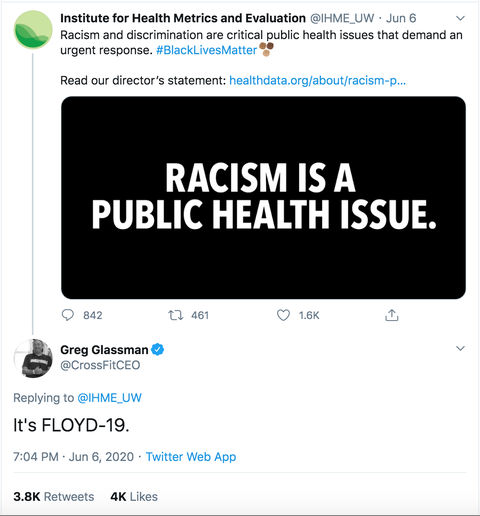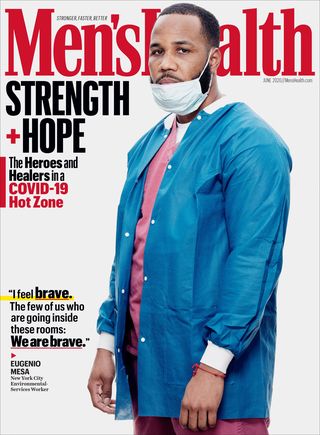Sparked by CrossFit HQ’s response to the Black Lives Matter protests and CrossFit CEO Greg Glassman’s racist tweet regarding George Floyd, an open rebellion is underway within the CrossFit community.
Key corporate and seminar staff are resigning, companies are pulling their sponsorships, elite athletes are threatening to boycott the upcoming CrossFit Games, and hundreds of gyms are reportedly dropping their affiliations, including some of the oldest, largest, and most influential boxes. Even for an organization that’s no stranger to controversy, these developments are by far the most serious threat to CrossFit’s existence and could radically transform the company’s place as the premier brand for competitive functional fitness.
What Has Happened with Greg Glassman and CrossFit So Far
On Tuesday June 2nd, when almost every organization was releasing statements to support or acknowledge the Black Lives Matter protests—which notably included the NFL reversing its stance on peaceful protests—CrossFit HQ stayed noticeably silent. “In a community that is known for honoring soldiers, firefighters and raising awareness for cancer and other hardships,” wrote Stacy Pugh, the founder of Black Power Cleans Lifting Club, “the CrossFit community has said nothing about the loss of black lives.”
Tensions between affiliates and CrossFit HQ were highlighted on Friday, June 5th, when Alyssa Royse of Seattle’s Rocket Community Fitness (formerly Rocket CrossFit), posted an email exchange she claimed was between herself and Glassman (CrossFit HQ did not respond to a request for comment verifying the screenshot’s authenticity, or regarding any other aspect of the situation).
In response to Royse questioning where CrossFit stood on the current movement, Glassman allegedly responded with insults. “You’re doing your best to brand us as racist and you know it’s bullshit,” the message reads. “That makes you a really shitty person. Do you understand that? You’ve let your politics warp you into something that strikes me as wrong to the point of being evil.”
The following day, Glassman responded to a tweet from the Institute for Health Metrics and Evaluation saying that, “Racism and discrimination are critical public health issues,” with a racist quip: “It’s FLOYD-19,” callously referencing George Floyd. The next day, he added to the thread that this reference to COVID-19 was an attempt to “stick it” to the IHME for their “invalidated models resulting in needless, economy-wrecking, life-wrecking lockdown.” He did not mention Alyssa Royse’s blog post, which she says has been read over 300,000 times so far.

Screenshot/Twitter
On June 7th, Mike Young, a CrossFit affiliate owner in North Carolina, published a Medium post alleging that, in a Zoom call the day prior, Glassman said, repeatedly, “I do not mourn George Floyd.” For Young, that was enough to end his own affiliation with CrossFit. “This decision will almost certainly come at a cost to my business,” Young writes, “but I no longer wish to associate with a company and CEO who are tone deaf and insensitive to our current national crises and so willing to inflame racial divisions.”
.@CrossFitCEO: “I, CrossFit HQ, and the CrossFit community will not stand for racism. I made a mistake by the words I chose yesterday.
My heart is deeply saddened by the pain it has caused. It was a mistake, not racist but a mistake.
Glassman issued an apology via CrossFit’s Twitter account later on June 7th. Notably, he refused to acknowledge that his comments were racist and doubled down on his attacks on public health organizations—but for many affiliates, employees, and athletes, this was too little, too late.
CrossFit Gyms Disaffiliate from the Brand
According to reporting from the The Morning Chalk Up and an unverified list published on Reddit, hundreds of gyms are dropping or have dropped their affiliations, including CrossFit Invictus, CrossFit South Brooklyn, and CrossFit New England, three of the most prominent boxes in the country.
The decision to abandon CrossFit is still a weighty one for affiliates. “We immediately thought, ‘We can’t be associated with this,” says Sam Orme, a former competitor in the CrossFit Games and the owner of CrossFit Virtuosity, a 12-year affiliate in Williamsburg, Brooklyn. “But realistically, 50 percent of our leads come from people searching ‘CrossFit’ on Google. Thanks to the pandemic, we’ve had a lot of members lose their jobs or move out of the city permanently, so to give up potentially 50 percent of our leads going forward—you know, honestly, we could go out of business.”
Still, when Orme put the question to the coaching staff, everyone agreed to disaffiliate, and the response has been nothing but positive. “In New York, it’s sort of a no-brainer because it’s such a liberal city,” she says. “Nobody is really going to say out loud that they stand against [the Black Lives Matter movement].”
“It just made me think that he thinks that racism and police brutality are also overblown.”
But even in rural Kansas, affiliates are upset with Glassman’s statements. Christina Spencer has been doing CrossFit since 2008 and quit her job as a teacher to co-open Junction City CrossFit in 2012. Last week, Spencer noticed that CrossFit hadn’t issued a statement like other organizations—but she wasn’t particularly upset. “As a black person, while that bothers me, that’s not unusual, right?” she says. “Most white people are—not that they’re okay with what happened—but they have a high tolerance for it because it doesn’t directly impact them.”
However, when she saw Glassman’s tweet, Spencer was pissed. “Knowing that he thought the coronavirus was overblown and handled completely incorrectly, by him saying ‘FLOYD-19,’ it just made me think that he thinks that racism and police brutality are also overblown,” she says.
Spencer says she is still considering to renew Junction City CrossFit’s affiliate dues in November—but only in order to promote a more proactively anti-racist culture from within the organization. “How many black, indigenous, people of color do you see working at [CrossFit] HQ? How many are on your seminar staff? How many are working on the social media team? And the ancillary apparel and supplement companies that have sprung up, you don’t see people of color on those advertisements, either.”
Spencer says she also supports honoring George Floyd with tribute workouts, a tradition in CrossFit, but she wants to see them programmed and executed with intention. “The same way we honor fallen police officers and firefighters, it has to be with that same tenacity that we talk about civil rights,” she says.
CrossFit Has Changed Before
For many, what makes CrossFit’s inaction especially frustrating is that the company has shown a willingness to change for the LGBTQIA+ community.
In 2014, the sport’s governing body banned a trans woman from competition. In response, many within the community, including Alyssa Royse from Rocket Community Fitness, worked to make the sport more welcoming for LGBTQIA+ participants. In 2018, after CrossFit’s Chief Knowledge Officer thanked an affiliate for cancelling its Pride event and “refusing to celebrate sin,” he was fired almost immediately.
“Why can’t we talk about how racism is a public health issue?”
Later that same day, Glassman was quoted saying he’s “crazy proud of the gay community in CrossFit,” and a few months later, the company announced that it was adopting the International Olympics Committee’s guidelines allowing transgender athletes to compete.
Glassman’s silence on racial justice was also disappointing to observers because, in the past few years, he’s refocused CrossFit on combating chronic diseases, weeding out junk science, and fighting the influence of Big Soda—issues that disproportionately affect Black Americans. “Why can’t we talk about how racism is a public health issue the same way we talk about the food industry being a public health issue?” says Spencer, the Kansas gym owner.
CrossFit’s Competitive Future Hangs in the Balance

AzmanLGetty Images
However, there may not be a CrossFit competition left to compete in this year, or for the foreseeable future.
Because of the COVID-19 crisis, the planned 2020 CrossFit Games had already been radically changed from years past. Teens, masters, and team divisions were cut, the number of individual athlete slots was reduced, and the competition site was moved from Madison, Wisconsin to a private ranch in Alamos, California. But now, even if health authorities were to allow the Games to continue this year, their long term fate is uncertain.
Some sponsors, like FitAid, have already pulled their support after Glassman’s racist tweet and the lack of response from CrossFit HQ. Reebok, the Games’ exclusive title sponsor, has announced that it won’t be renewing its contract with CrossFit after this year, including its multi-million dollar prize purse for the Games and its line of CrossFit-trademarked apparel. Rogue, another major sponsor, is removing the CrossFit logo from its upcoming invitational—but has left the door open to continuing its relationship with the company: “The future is dependent on the direction and leadership within CrossFit HQ. Rogue has been the equipment provider since 2010 and we believe it is part of our DNA,” read the brand’s statement. “We hope there is a path forward.”
Likewise, many elite athletes are cautiously optimistic that change within CrossFit is still possible. However, until it materializes, four have declared their intention to withdraw from the 2020 competition. One of the first to do so was Noah Ohlsen, a six-time Games athlete and last year’s runner-up. “I felt like I had the opportunity to go from just talking to backing up my words with a strong action,” says Ohlsen. “But I’m not going to call anybody and urge them to also pull out of the Games. I know that’s an incredibly difficult decision.”
“There will be a new sort of ethical framework for inclusive coaching that comes from this.”
According to Ohlsen, he and Chandler Smith, another athlete who’s tentatively withdrawn and one of few elite Black CrossFitters, also considered going to the Games and making a statement there. “But, what if neither of us make the podium?” Ohlsen says. “That’s a possibility, and then nothing is said and nothing changes, and how guilty would we feel that we missed out on this opportunity?”
But the Games are only a small part of what CrossFit is. The competition is the centerpiece of the elite CrossFit season—but there’s a host of smaller events throughout the year that are approved by CrossFit but managed by outside companies. On Monday, Loud and Live, which runs the Granite Games, Wodapalooza, the West Coast Classic, the Mayan CrossFit Classic, and the Madrid CrossFit Championship, ended its affiliation with CrossFit. In total, the organizers behind 14 Sanctional events have removed the CrossFit brand from their operations.
If Loud and Live and other organizers have the financial support of brands like Reebok, Rogue, or the hundreds of newly independent affiliates, they could fundamentally transform the infrastructure of the style of functional fitness CrossFit popularized. That’s the hope for Alyssa Royse, the owner of Rocket Community Fitness. “I believe, because I intend to be a part of it, that there will be a new sort of ethical framework for inclusive coaching that comes from this,” she says. “Now that this exoskeleton is gone, we can all break free and blossom as our own thing and come together to do something amazing.”

Source: Read Full Article
